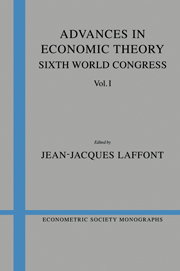Book contents
- Frontmatter
- 1 Foundations of game theory
- 2 Refinements of Nash equilibrium
- 3 Explaining cooperation and commitment in repeated games
- 4 Repeated games: cooperation and rationality
- 5 Implementation, contracts, and renegotiation in environments with complete information
- 6 Implementation in Bayesian equilibrium: the multiple equilibrium problem in mechanism design
2 - Refinements of Nash equilibrium
Published online by Cambridge University Press: 05 January 2013
- Frontmatter
- 1 Foundations of game theory
- 2 Refinements of Nash equilibrium
- 3 Explaining cooperation and commitment in repeated games
- 4 Repeated games: cooperation and rationality
- 5 Implementation, contracts, and renegotiation in environments with complete information
- 6 Implementation in Bayesian equilibrium: the multiple equilibrium problem in mechanism design
Summary
INTRODUCTION
Non-cooperative game theory studies the question of what constitutes rational behavior in situations of strategic interaction in which players cannot communicate nor sign binding agreements. The traditional answer to this question centers around the notion of Nash equilibrium. Such an equilibrium is a vector of strategies, one for each player in the game, with the property that no single player can increase his payoff by changing to a different strategy as long as the opponents do not change their strategies. The Nash equilibrium concept is motivated by the idea that a theory of rational decision-making should not be a self-destroying prophecy that creates an incentive to deviate for those who believe in it. To quote from Luce and Raiffa (1957, p. 173):
if our non-cooperative theory is to lead to an n-tuple of strategy choices and if it is to have the property that knowledge of the theory does not lead one to make a choice different from that dictated by the theory, then the strategies isolated by the theory must be equilibrium points.
In other words, for a (commonly known) norm of behavior to be self-enforcing it is necessary that the norm (agreement) constitutes a Nash equilibrium.
The increased use of non-cooperative game theory in economics in the last decades has led to an increased awareness of the fact that not every Nash equilibrium can be considered as a self-enforcing norm of behavior. Very roughly, the Nash concept is unsatisfactory since it may prescribe irrational behavior in contingencies that arise when somebody has deviated from the norm. In applications, one typically finds many equilibria and intuitive, context depending arguments have been used to exclude the “unreasonable” ones. At the same time game theorists have tried to formalize and unify the intuitions conveyed by applications and examples by means of general refined equilibrium notions.
- Type
- Chapter
- Information
- Advances in Economic TheorySixth World Congress, pp. 32 - 88Publisher: Cambridge University PressPrint publication year: 1993
- 3
- Cited by



